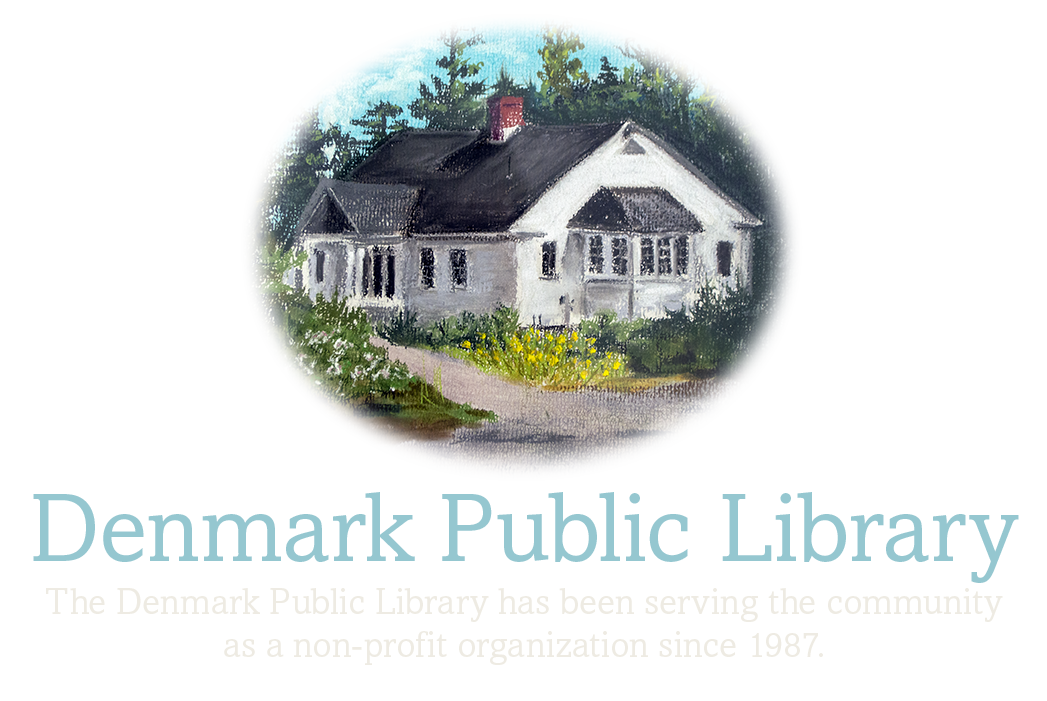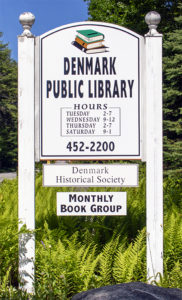Challenged Material Policy
The purpose of this policy is to provide steps for patrons who wish to challenge materials in the Denmark Public Library (DPL) collection. The Library subscribes to the provisions of the Freedom to Read Statement as adopted by the American Library Association (see Appendix A). All individuals have the right to choose which library materials they will use. However, no one has the right to restrict the freedom of others to read whatever they wish.
DEFINITIONS
Children – Library users under the age of 14. The DPL offers cards without parental or guardian signature to persons ages 14 and older and considers them Members.
Collection – All materials available for public use both in the Library, on its website, and for patron check-out.
Materials – Books (print and electronic), magazines, non-traditional offerings, newspapers, audio-visual, and electronic databases
POLICY
- The DPL provides free access to materials in a variety of formats (print, electronic, and other media). In order to be inclusive, rather than exclusive, in developing its collections and assure all users access to legally obtainable materials, the DPL chooses a wide range of materials. Library users make their own choices as to what they will use based on individual interests and concerns, and the DPL will not exclude materials on the grounds that they may offend some library users or library staff, on the basis of partisanship, religion, or politics, or that some might consider them to be inappropriate for children.
- Materials will not be excluded from the DPL collection based by the possibility that they may come into the possession of children, and children are not limited to the children’s collection. Responsibility for a child’s reading rests with the parent or guardian, not the DPL.
- No material will be reviewed or considered for removal based solely on race, religion, gender, gender identity, sexual orientation, veteran’s status, disability, language, or any other protected, historically oppressed, or minority classification.
- A patron who wishes to challenge any of the DPL’s collection material must complete the Challenged Materials Request Form (See Appendix B) and submit it to the Librarian.
REVIEW OF CHALLENGED MATERIALS REQUESTS
- The Librarian will provide the initial review of any Challenged Material Request and provide a verbal response to the patron who presented the challenge.
- If the patron is not satisfied with the Librarian’s response, the patron may request reconsideration, in which case the Librarian will forward the Challenged Materials Request Form to the DPL Board of Trustees for review. The Librarian will serve in an advisory capacity for their review but have no vote. The Board of Trustees will provide a written response within 30 days of receiving the Request Form.
- Material may not be challenged more than once. After a decision has been rendered by the Board of Trustees, it will not be reviewable again.
- Any challenged material will remain on the shelf and available for circulation during the review period.
This policy was adopted by the Denmark Public Library Board of Trustees on April 14, 2022
Challenged Materials Policy
APPENDIX A: The Freedom to Read Statement, A Joint Statement by the American Library Association and the Association of American Publishers, adopted June 25, 1953; affirmed June 30, 2004.
The freedom to read is essential to our democracy. It is continuously under attack. Private groups and public authorities in various parts of the country are working to remove or limit access to reading materials, to censor content in schools, to label “controversial” views, to distribute lists of “objectionable” books or authors, and to purge libraries. These actions apparently rise from a view that our national tradition of free expression is no longer valid; that censorship and suppression are needed to counter threats to safety or national security, as well as to avoid the subversion of politics and the corruption of morals. We, as individuals devoted to reading and as librarians and publishers responsible for disseminating ideas, wish to assert the public interest in the preservation of the freedom to read.
Most attempts at suppression rest on a denial of the fundamental premise of democracy: that the ordinary individual, by exercising critical judgment, will select the good and reject the bad. We trust Americans to recognize propaganda and misinformation, and to make their own decisions about what they read and believe. We do not believe they are prepared to sacrifice their heritage of a free press in order to be “protected” against what others think may be bad for them. We believe they still favor free enterprise in ideas and expression.
These efforts at suppression are related to a larger pattern of pressures being brought against education, the press, art and images, films, broadcast media, and the Internet. The problem is not only one of actual censorship. The shadow of fear cast by these pressures leads, we suspect, to an even larger voluntary curtailment of expression by those who seek to avoid controversy or unwelcome scrutiny by government officials.
Such pressure toward conformity is perhaps natural to a time of accelerated change. And yet suppression is never more dangerous than in such a time of social tension. Freedom has given the United States the elasticity to endure strain. Freedom keeps open the path of novel and creative solutions, and enables change to come by choice. Every silencing of a heresy, every enforcement of an orthodoxy, diminishes the toughness and resilience of our society and leaves it the less able to deal with controversy and difference.
Now as always in our history, reading is among our greatest freedoms. The freedom to read and write is almost the only means for making generally available ideas or manners of expression that can initially command only a small audience. The written word is the natural medium for the new idea and the untried voice from which come the original contributions to social growth. It is essential to the extended discussion that serious thought requires, and to the accumulation of knowledge and ideas into organized collections.
We believe that free communication is essential to the preservation of a free society and a creative culture. We believe that these pressures toward conformity present the danger of limiting the range and variety of inquiry and expression on which our democracy and our culture depend. We believe that every American community must jealously guard the freedom to publish and to circulate, in order to preserve its own freedom to read. We believe that publishers and librarians have a profound responsibility to give validity to that freedom to read by making it possible for the readers to choose freely from a variety of offerings.
Approved by the Denmark Library Board of Trustees, April 14, 2022.
Challenged Materials Policy
APPENDIX B: Challenge to Materials Form – Denmark Public Library
Material challenged:
Title ________________________________________________________
Author: _____________________________________________________
Request initiated by:
Name:_______________________________________________________
Address: _____________________________________________________
Town, State, Zip Code
Email: ____________________Phone: ________________Date: _________
Affiliated Organization (if any):____________________________________
- What in and about the material do you object to? (Please be specific, cite examples, page numbers or run times if it is a video): ______________________________________________________________________________________________________________________________________________________
- How was the item brought to your attention?
___________________________________________________________________________
___________________________________________________________________________
- Have you read, viewed, or listened to the material in its entirety? ____Yes / ____No
- Is there anything good or of value in this material? ____Yes / ____No
- If “Yes” what?_______________________________________________________________
- What resolution do you request for this material?__________________________________
___________________________________________________________________________
Please provide any additional information related to this challenge.
______________________________________________________________________________
*****************************************************************
LIBRARY USE:
Date received:____________________________
Librarian Action: ______________________________________________Date:__________
Appeal (if any) _________________________Referred to the Board, Date:______________
Final Decision:_______________________________________________________________
___________________________________________________________________________

